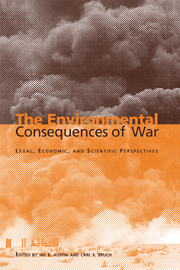Book contents
- Frontmatter
- Contents
- List of illustrations
- List of tables
- List of contributors
- Acknowledgements
- Foreword by Klaus Toepfer
- Introduction
- Part I General principles
- Part II The legal framework
- Part III Assessing the impacts – scientific methods and issues
- Part IV Valuing the impacts – economic methods and issues
- Introduction
- 19 Restoration-based approaches to compensation for natural resource damages: moving towards convergence in US and international law
- 20 Valuing public health damages arising from war
- 21 Valuing the health consequences of war
- Part V Prospects for the future
- Index
21 - Valuing the health consequences of war
Published online by Cambridge University Press: 04 August 2010
- Frontmatter
- Contents
- List of illustrations
- List of tables
- List of contributors
- Acknowledgements
- Foreword by Klaus Toepfer
- Introduction
- Part I General principles
- Part II The legal framework
- Part III Assessing the impacts – scientific methods and issues
- Part IV Valuing the impacts – economic methods and issues
- Introduction
- 19 Restoration-based approaches to compensation for natural resource damages: moving towards convergence in US and international law
- 20 Valuing public health damages arising from war
- 21 Valuing the health consequences of war
- Part V Prospects for the future
- Index
Summary
Introduction
Wars often involve major health consequences for thousands of individuals. Those affected include the combatants from the countries engaged in the conflict, armed forces from other nations, and citizenry. These groups also could include individuals far removed from the conflict if, for example, chemical exposures from the combat situation led to genetic damage that harmed the offspring of a combatant.
This chapter addresses how adverse consequences resulting from war should be valued from the standpoint of compensation. In undertaking this analysis, I will make the assumption that compensation is appropriate. In some instances involving war, providing compensation may strike one as being quite odd. For example, one would not think that a nation that launched an aggression would seek financial compensation for the injuries to the soldiers who were killed in such a conflict. What I will assume, then, is that there has been a determination that compensation is warranted, and the remaining issue is how such compensation should be set.
This subject in a generic sense has been the focus of a considerable literature in economics. How one should set compensation will depend in large part on the purpose one is trying to achieve through such compensation. In particular, is the intent to insure the losses of the accident victim or to provide deterrence? The principal message of this chapter is that the standard objective in compensatory legal contexts should be an insurance function so that compensation for economic loss should be the guiding principle determining the value of the adverse health consequences of wars. The valuation of health outcomes is not a straightforward proposition.
- Type
- Chapter
- Information
- The Environmental Consequences of WarLegal, Economic, and Scientific Perspectives, pp. 530 - 556Publisher: Cambridge University PressPrint publication year: 2000
- 1
- Cited by



